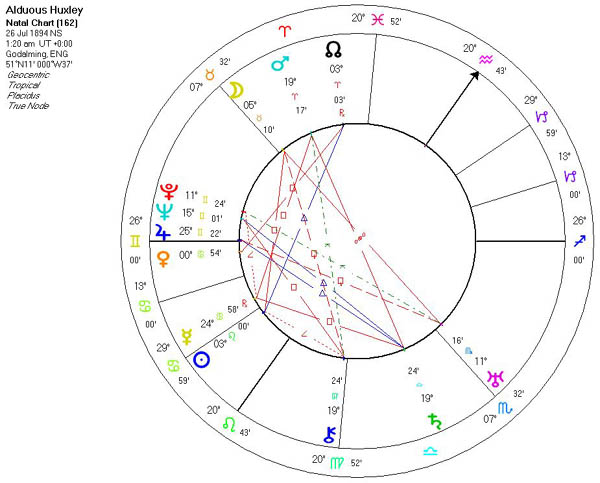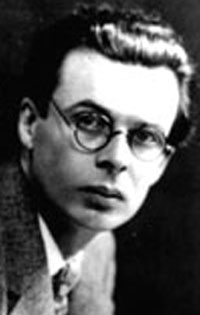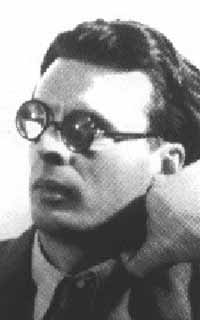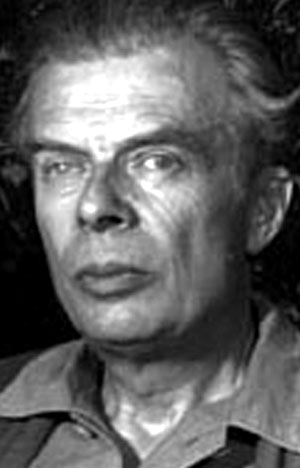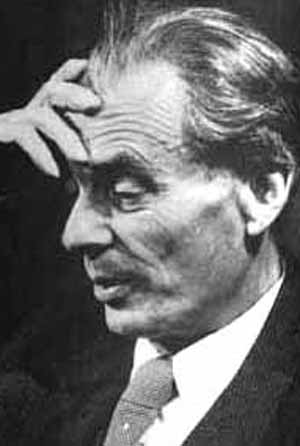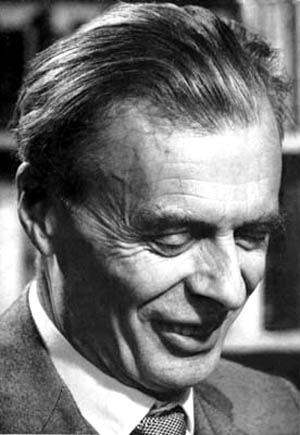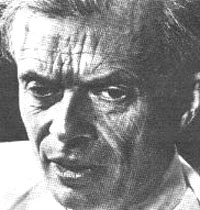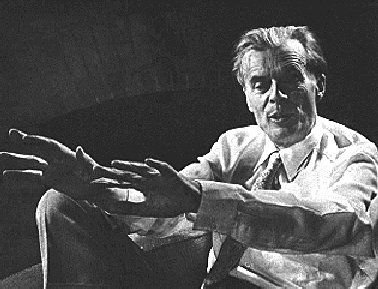Aldous Huxley
Copyright Michael D. Robbins 2005
Astro-Rayological
Interpretation & Charts
Quotes
Biography
Images and Physiognomic Interpretation
"Who lives longer? the man who takes heroin for two years and dies, or a man who lives on roast beef, water and potatoes 'till 95? One passes his 24 months in eternity. All the years of the beefeater are lived only in time"
"When the doors of perception are cleansed, things will appear to man as they truly are, infinite."
A bad book is as much of a labor to write as a good one, it comes as sincerely from the author's soul.
A belief in hell and the knowledge that every ambition is doomed to frustration at the hands of a skeleton have never prevented the majority of human beings from behaving as though death were no more than an unfounded rumor.
A child-like man is not a man whose development has been arrested; on the contrary, he is a man who has given himself a chance of continuing to develop long after most adults have muffled themselves in the cocoon of middle-aged habit and convention.
A competent portraitist knows how to imply the profile in the full face.
A democracy which makes or even effectively prepares for modern, scientific war must necessarily cease to be democratic. No country can be really well prepared for modern war unless it is governed by a tyrant, at the head of a highly trained and perfectly obedient bureaucracy.
A man may be a pessimistic determinist before lunch and an optimistic believer in the will's freedom after it.
After silence, that which comes nearest to expressing the inexpressible is music.
All gods are homemade, and it is we who pull their strings, and so, give them the power to pull ours.
An intellectual is a person who's found one thing that's more interesting than sex.
An unexciting truth may be eclipsed by a thrilling lie.
Beauty is worse than wine, it intoxicates both the holder and beholder.
Children are remarkable for their intelligence and ardor, for their curiosity, their intolerance of shams, the clarity and ruthlessness of their vision.
Consistency is contrary to nature, contrary to life. The only completely consistent people are dead.
Dream in a pragmatic way.
Every man who knows how to read has it in his power to magnify himself, to multiply the ways in which he exists, to make his life full, significant and interesting.
Every man's memory is his private literature.
Every person who knows how to read has it in their power to magnify themselves, to multiply the ways in which they exist, to make life full, significant, and interesting.
Experience is not what happens to you; it's what you do with what happens to you.
Experience teaches only the teachable.
Facts do not cease to exist because they are ignored.
From their experience or from the recorded experience of others (history), men learn only what their passions and their metaphysical prejudices allow them to learn.
Good is a product of the ethical and spiritual artistry of individuals; it cannot be mass-produced.
Great is truth, but still greater, from a practical point of view, is silence about truth. By simply not mentioning certain subjects... totalitarian propagandists have influenced opinion much more effectively than they could have by the most eloquent denunciations.
I'm afraid of losing my obscurity. Genuineness only thrives in the dark. Like celery.
Idealism is the noble toga that political gentlemen drape over their will to power.
Ignore death up to the last moment; then, when it can't be ignored any longer, have yourself squirted full of morphia and shuffle off in a coma. Thoroughly sensible, humane and scientific, eh?
It's with bad sentiments that one makes good novels.
Man is an intelligence in servitude to his organs.
Maybe this world is another planet's hell.
Most human beings have an almost infinite capacity for taking things for granted.
Most ignorance is vincible ignorance. We don't know because we don't want to know.
Most of one's life is one prolonged effort to prevent oneself thinking.
Most vices demand considerable self-sacrifices. There is no greater mistake than to suppose that a vicious life is a life of uninterrupted pleasure. It is a life almost as wearisome and painful - if strenuously led - as Christian's in The Pilgrim's Progress.
My fate cannot be mastered; it can only be collaborated with and thereby, to some extent, directed. Nor am I the captain of my soul; I am only its noisiest passenger.
My father considered a walk among the mountains as the equivalent of churchgoing.
No man ever dared to manifest his boredom so insolently as does a Siamese tomcat when he yawns in the face of his amorously importunate wife.
Now, a corpse, poor thing, is an untouchable and the process of decay is, of all pieces of bad manners, the vulgarest imaginable. For a corpse is, by definition, a person absolutely devoid of savoir vivre.
One of the great attractions of patriotism - it fulfills our worst wishes. In the person of our nation we are able, vicariously, to bully and cheat. Bully and cheat, what's more, with a feeling that we are profoundly virtuous.
One of the many reasons for the bewildering and tragic character of human existence is the fact that social organization is at once necessary and fatal. Men are forever creating such organizations for their own convenience and forever finding themselves the victims of their home-made monsters.
Orthodoxy is the diehard of the world of thought. It learns not, neither can it forget.
Proverbs are always platitudes until you have personally experienced the truth of them.
Several excuses are always less convincing than one.
Single-mindedness is all very well in cows or baboons; in an animal claiming to belong to the same species as Shakespeare it is simply disgraceful.
So long as men worship the Caesars and Napoleons, Caesars and Napoleons will duly arise and make them miserable.
Speed provides the one genuinely modern pleasure.
Speed, it seems to me, provides the one genuinely modern pleasure.
Technological progress has merely provided us with more efficient means for going backwards.
That all men are equal is a proposition to which, at ordinary times, no sane human being has ever given his assent.
That men do not learn very much from the lessons of history is the most important of all the lessons of history.
That we are not much sicker and much madder than we are is due exclusively to that most blessed and blessing of all natural graces, sleep.
The author of the Iliad is either Homer or, if not Homer, somebody else of the same name.
The business of a seer is to see; and if he involves himself in the kind of God-eclipsing activities which make seeing impossible, he betrays the trust which his fellows have tacitly placed in him.
The charm of history and its enigmatic lesson consist in the fact that, from age to age, nothing changes and yet everything is completely different.
The condition of being forgiven is self-abandonment. The proud man prefers self-reproach, however painful - because the reproached self isn't abandoned; it remains intact.
The course of every intellectual, if he pursues his journey long and unflinchingly enough, ends in the obvious, from which the non-intellectuals have never stirred.
The finest works of art are precious, among other reasons, because they make it possible for us to know, if only imperfectly and for a little while, what it actually feels like to think subtly and feel nobly.
The most distressing thing that can happen to a prophet is to be proved wrong. The next most distressing thing is to be proved right.
The most valuable of all education is the ability to make yourself do the thing you have to do, when it has to be done, whether you like it or not.
The proper study of mankind is books.
The secret of genius is to carry the spirit of the child into old age, which mean never losing your enthusiasm.
The traveller's-eye view of men and women is not satisfying. A man might spend his life in trains and restaurants and know nothing of humanity at the end. To know, one must be an actor as well as a spectator.
The vast majority of human beings dislike and even actually dread all notions with which they are not familiar... Hence it comes about that at their first appearance innovators have generally been persecuted, and always derided as fools and madmen.
There is no substitute for talent. Industry and all its virtues are of no avail.
There isn't any formula or method. You learn to love by loving - by paying attention and doing what one thereby discovers has to be done.
There's only one corner of the universe you can be certain of improving, and that's your own self.
Thought must be divided against itself before it can come to any knowledge of itself.
To his dog, every man is Napoleon; hence the constant popularity of dogs.
To travel is to discover that everyone is wrong about other countries.
Uncontrolled, the hunger and thirst after God may become an obstacle, cutting off the soul from what it desires. If a man would travel far along the mystic road, he must learn to desire God intensely but in stillness, passively and yet with all his heart and mind and strength.
We are all geniuses up to the age of ten.
We participate in a tragedy; at a comedy we only look.
What is absurd and monstrous about war is that men who have no personal quarrel should be trained to murder one another in cold blood.
What we feel and think and are is to a great extent determined by the state of our ductless glands and viscera.
What with making their way and enjoying what they have won, heroes have no time to think. But the sons of heroes - ah, they have all the necessary leisure.
Where beauty is worshipped for beauty's sake as a goddess, independent of and superior to morality and philosophy, the most horrible putrefaction is apt to set in. The lives of the aesthetes are the far from edifying commentary on the religion of beauty.
Which is better: to have fun with fungi or to have Idiocy with ideology, to have wars because of words, to have tomorrow's misdeeds out of yesterday's miscreeds?
Words from the thread on which we string our experiences.
You shall know the truth, and the truth shall make you mad.
Your true traveller finds boredom rather agreeable than painful. It is the symbol of his liberty - his excessive freedom. He accepts his boredom, when it comes, not merely philosophically, but almost with pleasure.
Aldous Leonard Huxley was born on July 26, 1894, into a family that included some of the most distinguished members of that part of the English ruling class made up of the intellectual elite. Aldous' father was the son of Thomas Henry Huxley, a great biologist who helped develop the theory of evolution. His mother was the sister of Mrs. Humphrey Ward, the novelist; the niece of Matthew Arnold, the poet; and the granddaughter of Thomas Arnold, a famous educator and the real-life headmaster of Rugby School who became a character in the novel Tom Brown's Schooldays.
Undoubtedly, Huxley's heritage and upbringing had an effect on his work. Gerald Heard, a longtime friend, said that Huxley's ancestry "brought down on him a weight of intellectual authority and a momentum of moral obligations." Throughout Brave New World you can see evidence of an ambivalent attitude toward such authority assumed by a ruling class.
Like the England of his day, Huxley's Utopia possesses a rigid class structure, one even stronger than England's because it is biologically and chemically engineered and psychologically conditioned. And the members of Brave New World's ruling class certainly believe they possess the right to make everyone happy by denying them love and freedom.
Huxley's own experiences made him stand apart from the class into which he was born. Even as a small child he was considered different, showing an alertness, an intelligence, what his brother called a superiority. He was respected and loved--not hated--for these abilities, but he drew on that feeling of separateness in writing Brave New World. Bernard Marx and Helmholtz Watson, both members of the elite class, have problems because they're different from their peers. Huxley felt that heredity made each individual unique, and the uniqueness of the individual was essential to freedom. Like his family, and like the Alphas of Brave New World, Huxley felt a moral obligation--but it was the obligation to fight the idea that happiness could be achieved through class-instituted slavery of even the most benevolent kind.
Another event that marked Huxley was his mother's death from cancer when he was 14. This, he said later, gave him a sense of the transience of human happiness. Perhaps you can also see the influence of his loss in Brave New World. The Utopians go to great lengths to deny the unpleasantness of death, and to find perpetual happiness. But the cost is very great. By denying themselves unpleasant emotions they deny themselves deeply joyous ones as well. Their happiness can be continued endlessly by taking the drug soma, by making love, or by playing Obstacle Golf, but this happiness is essentially shallow. Standing in contrast to the Utopians are the Savages on the Reservation in New Mexico: poor, dirty, subject to the ills of old age and painful death, but, Huxley seems to believe, blessed with a happiness that while still transient is deeper and more real than that enjoyed by the inhabitants of London and the rest of the World State.
When Huxley was 16 and a student at the prestigious school Eton, an eye illness made him nearly blind. He recovered enough vision to go on to Oxford University and graduate with honors, but not enough to fight in World War I, an important experience for many of his friends, or to do the scientific work he had dreamed of. Scientific ideas remained with him, however, and he used them in many of his books, particularly Brave New World. The idea of vision also remained important to him; his early novels contain scenes that seem ideal for motion pictures, and he later became a screenwriter.
He entered the literary world while he was at Oxford, meeting writers like Lytton Strachey and Bertrand Russell and becoming close friends with D. H. Lawrence, with whom you might think he had almost nothing in common.
Huxley published his first book, a collection of poems, in 1916. He married Maria Nys, a Belgian, in 1919. Their only child, Matthew Huxley, was born in 1920. The family divided their time between London and Europe, mostly Italy, in the 1920s, and traveled around the world in 1925 and 1926, seeing India and making a first visit to the United States.
Huxley liked the confidence, vitality, and "generous extravagance" he found in American life. But he wasn't so sure he liked the way vitality was expressed "in places of public amusement, in dancing and motoring... Nowhere, perhaps, is there so little conversation... It is all movement and noise, like the water gurgling out of a bath--down the waste. Yes, down the waste." Those thoughts of the actual world, from the book Jesting Pilate, were to color his picture of the perpetual happiness attempted in Brave New World.
His experiences in fascist Italy, where Benito Mussolini led an authoritarian government that fought against birth control in order to produce enough manpower for the next war, also provided materials for Huxley's dystopia, as did his reading of books critical of the Soviet Union.
Huxley wrote Brave New World in four months in 1931. It appeared three years after the publication of his best-seller, the novel Point Counter Point. During those three years, he had produced six books of stories, essays, poems, and plays, but nothing major. His biographer, Sybille Bedford, says, "It was time to produce some full-length fiction--he still felt like holding back from another straight novel--juggling in fiction form with the scientific possibilities of the future might be a new line."
Because Brave New World describes a dystopia, it is often compared with George Orwell's 1984, another novel you may want to read, which also describes a possible horrible world of the future. The world of 1984 is one of tyranny, terror, and perpetual warfare. Orwell wrote it in 1948, shortly after the Allies had defeated Nazi Germany in World War II and just as the West was discovering the full dimensions of the evils of Soviet totalitarianism.
It's important to remember that Huxley wrote Brave New World in 1931, before Adolf Hitler came to power in Germany and before Joseph Stalin started the purges that killed millions of people in the Soviet Union. He therefore had no immediate real-life reason to make tyranny and terror major elements of his story. In 1958 Huxley himself said, "The future dictatorship of my imaginary world was a good deal less brutal than the future dictatorship so brilliantly portrayed by Orwell."
In 1937, the Huxleys came to the United States; in 1938 they went to Hollywood, where he became a screenwriter (among his films was an adaptation of Jane Austen's Pride and Prejudice, which starred the young Laurence Olivier). He remained for most of his life in California, and one of his novels caricatures what he saw as the strange life there: After Many a Summer Dies the Swan. In it the tycoon Jo Stoyte tries to achieve immortality through scientific experimentation, even if it means giving up humanity and returning to the completely animal state--an echo of Brave New World.
In 1946 Huxley wrote a Foreword to Brave New World in which he said he no longer wanted to make social sanity an impossibility, as he had in the novel. Though World War II had caused the deaths of some 20 million inhabitants of the Soviet Union, six million Jews, and millions of others, and the newly developed atomic bomb held the threat of even more extensive destruction, Huxley had become convinced that while still "rather rare," sanity could be achieved and said that he would like to see more of it. In the same year, he published The Perennial Philosophy, an anthology of texts with his own commentaries on mystical and religious approaches to a sane life in a sane society.
He also worried about the dangers that threatened sanity. In 1958, he published Brave New World Revisited, a set of essays on real-life problems and ideas you'll find in the novel--overpopulation, overorganization, and psychological techniques from salesmanship to hypnopaedia, or sleep-teaching. They're all tools that a government can abuse to deprive people of freedom, an abuse that Huxley wanted people to fight. If you want to further relate his bad new world to the real world, read Brave New World Revisited.
In the 1950s Huxley became famous for his interest in psychedelic or mind-expanding drugs like mescaline and LSD, which he apparently took a dozen times over ten years. Sybille Bedford says he was looking for a drug that would allow an escape from the self and that if taken with caution would be physically and socially harmless.
He put his beliefs in such a drug and in sanity into several books. Two, based on his experiences taking mescaline under supervision, were nonfiction: Doors of Perception (1954) and Heaven and Hell (1956). Some readers have read those books as encouragements to experiment freely with drugs, but Huxley warned of the dangers of such experiments in an appendix he wrote to The Devils of Loudun (1952), a psychological study of an episode in French history.
Another work centering on drugs and sanity was Island (1962), a novel that required 20 years of thought and five years of writing. Among other things, Island was an antidote to Brave New World, a good Utopia. Huxley deplored the drug he called soma in Brave New World--half tranquilizer, half intoxicant--which produces an artificial happiness that makes people content with their lack of freedom. He approved of the perfected version of LSD that the people of Island use in a religious way.
Huxley produced 47 books in his long career as a writer. The English critic Anthony Burgess has said that he equipped the novel with a brain. Other critics objected that he was a better essayist than novelist precisely because he cared more about his ideas than about plot or characters, and his novels' ideas often get in the way of the story.
But Huxley's emphasis on ideas and his skill as an essayist cannot hide one important fact: The books he wrote that are most read and best remembered today are all novels--Crome Yellow, Antic Hay, and Point Counter Point from the 1920s, Brave New World and After Many a Summer Dies the Swan from the 1930s. In 1959 the American Academy of Arts and Letters gave him the Award of Merit for the Novel, a prize given every five years; earlier recipients had been Ernest Hemingway, Thomas Mann, and Theodore Dreiser.
The range of Huxley's interests can be seen from his note that his "preliminary research" for Island included "Greek history, Polynesian anthropology, translations from Sanskrit and Chinese of Buddhist texts, scientific papers on pharmacology, neurophysiology, psychology and education, together with novels, poems, critical essays, travel books, political commentaries and conversations with all kinds of people, from philosophers to actresses, from patients in mental hospitals to tycoons in Rolls-Royces...." He used similar, though probably fewer, sources for Brave New World.
This list gives you some perspective on the wide range of ideas that Huxley studied. He also wrote an early essay on ecology that helped inspire today's environmental movement. And he was a pacifist. This belief prevented him from becoming an American citizen because he would not say his pacifism was a matter of his religion, which might have made him an acceptable conscientious objector.
Huxley remained nearly blind all his life. Maria Huxley died in 1955, and Huxley married Laura Archera a year later. He died November 22, 1963, the same day that President John F. Kennedy was assassinated. He was cremated, and his ashes were buried in his parents' grave in England
Early years
Huxley was born in Godalming, Surrey, England, being a son of the writer Leonard Huxley by his first wife, Julia Arnold; and grandson of Thomas Huxley. Julia died in 1908, when Aldous was only thirteen. Three years later he suffered an illness which seriously damaged his eyesight. His near-blindness disqualified him from service in World War I. Once his eyesight recovered, he read English literature at Balliol College, Oxford.
Huxley completed his first (unpublished) novel at the age of seventeen and began writing seriously in his early twenties. He wrote great novels on dehumanising aspects of scientific progress, most famously Brave New World), and on pacifist themes (e.g. Eyeless in Gaza). Huxley was strongly influenced by F. Matthias Alexander and included him as a character in Eyeless in Gaza.
Middle years
During World War I, he spent much of his time at Garsington Manor, home of Lady Ottoline Morrell. Later, in Crome Yellow (1921) he caricatured the Garsington lifestyle, but remained friendly with the Morrells. He married Maria Nys, whom he had met at Garsington.
Huxley moved to Llano, California in 1937, but like his friend the philosopher Gerald Heard who accompanied him, Huxley was denied citizenship since he refused to ascribe his pacifism to religious beliefs. In 1938 he befriended J. Krishnamurti, whose teachings he greatly admired. He became a Hindu in the circle of Swami Prabhavananda, and he also introduced Christopher Isherwood to this circle.
Later years
He started meditating and became a vegetarian. Thereafter, his works were strongly influenced by mysticism and his experiences with the hallucinogenic drug mescaline, to which he was introduced by the psychiatrist Humphry Osmond in 1953. Huxley's psychedelic drug experiences are described in the essays The Doors of Perception and Heaven and Hell. The title of the former became the inspiration for the naming of the rock band, The Doors. Some of his writings on psychedelics became frequent reading among early hippies. His wife, Maria, died of breast cancer in 1955, and in 1956 he re-married, to Laura Archera (Huxley).
In 1960, Huxley was diagnosed with throat cancer. In the years that followed, with his health deteriorating, he wrote the utopian novel Island, and gave lectures on "Human Potentialities" at the Esalen institute. His ideas were foundational to the forming of the Human Potential Movement. At a speech given in 1961 at the California Medical School in San Francisco, Huxley said: "There will be in the next generation or so a pharmacological method of making people love their servitude and producing dictatorship without tears, so to speak, producing a kind of painless concentration camp for entire societies so that people will in fact have their liberties taken away from them but will rather enjoy it."
Death and afterwards
On his deathbed, unable to speak, he made a written request to his wife for "LSD, 100 µg;, i.m" She obliged, and he died peacefully the following morning, November 22, 1963 (the same day as John F. Kennedy and C. S. Lewis).
Aldous Leonard Huxley was born on July 26, 1894 in Godalming, Surrey, in the SE of England. He was the third son of Dr. Leonard Huxley and Julia Arnold. Huxley belonged to a family whose members were recognised to be intellectual people. He was the grandson of Thomas Henry Huxley, who was a very important biologist who developed an interesting theory on the evolution. His aunt, Mrs. Humphrey Ward, was a famous late-Victorian novelist, and the father of his aunt, Matthew Arnold, was a poet. Aldous's mother was the granddaughter of Thomas Arnold, a famous educator. One of his brothers was a great zoologist, also the first direct of Unesco. So, observing the atmosphere in which Aldous Leonard grew up, we can tell that he was very influenced by his relatives. If we focus our attention on the book I want to analyse, we can see that there is a heritage in the book from both sides; there is the extraordinary capacity of writing, he has a determined style, and of course there is the knowledge of human evolution and his idea of a utopic future. The class structure that was so important in the England of Huxley’s childhood is also to be seen in the society which he presents in Brave New World.
Huxley had some experiences which made him stand apart from the class to which he belonged by birth. He was considered different as a child for his intelligence; we can also see that Huxley reflected this sense, this feeling of being an outsider in characters such as Bernard Marx and Hemholtz. These characters used to gather together and speak about their emotions that life produced on them. Huxley might have felt different from other people, like these two Alpha Plus men.
The death of his mother from cancer when he was only 14 , in 1908, meant also a change in his life; it gave him a sense of the transience of human happiness, and of course, it led to the break-up of the family home. You can also see the feeling that means the loss of one’s mother in Brave New World through the Savage’s reactions. In August 1914, one of his brothers, Trevenen, committed suicide; this also affected him of course, besides because Aldous was very close to him. Over twenty years later, in 1936, Huxley published Eyeless in Gaza, were the death of his mother and brother are reflected.
Huxley studied at the prestigious school Eton. At the age of 16, an eye illness made him nearly blind, and forced him to leave school. Therefore he couldn’t complete some scientific training that was so interesting for him; in the beginning, he intended to study medcine, then he turned to literature. Even though, his eyesight improved after a couple of years and he recovered enough to go to Oxford University where he graduated in English literature. He was unfit for military service and didn’t fight in World War I, which was an experience that marked a lot of his other colleges. Instead he worked as a farm labourer at Lady Ottoline Morrell's Garsington Manor. Huxley was very interested in science, and he had really good ideas related to the subject; he used some of these in Brave New World, although he never managed to work in a big scientific project.
While being at Oxford, he met writers like Lytton Strachey, D. H. Lawrence and Bertrand Russell.
Huxley started his career as a journalist, he also practised music and artistic criticism and made a few book reviews. Huxley published his first book in 1916, it was a collection of poems, "The Burning Wheel". The three books which followed this one, were also poem books, in which the influence of French symbolism is to be seen. He married in 1919 a Belgian refugee, Maria Nys, and they had a child, Matthew Huxley, the year after. By then Huxley was working for the Athenaeum magazine, after that, he became the first British editor of the magazine House and Garden; he also worked for Vogue. Huxley's family travelled a lot, especially between London and Italy, but also to places such as India and the United States. They lived first near Florence and then on the Côte d'Azur. In Along th Road, 1925, Huxley describes all the places and works of art he had taken in since his arrival in Italy.
Huxley he wrote many novels, which were more appreciated by the public than his essays and poems. He became more famous, with his reputation established, when his first novel "Crome Yellow" (1921) was published. Huxley wrote some comic novels, such as "Antic Hay" (1923) and "Those Barren Leaves" (1925); here he made clear that he had an extraordinary ability in introducing very intellectual ideas in fiction novels. In Crome Yellow and in Antic Hay he shows the expression of a mood of disenchantment in the early 1920s related to the past Victorian mores. His generation had experienced "the violent disruption of almost all the standards, conventions and values current in the previous epoch", in Huxley's words. Some people criticised the explicit discussion of sex in his novel Antic Hay, which was even burned in Cairo due to these criticisms. He published a book of essays about philosophical and social aspects in 1927, "Proper Studies".
When Huxley first visited the United States around 1926, he was amused by the extravagance of American society, but he didn’t like how American people spent their free time, spending it in useless things and not in trying to improve their mental capacity "Nowhere, perhaps, is there so little conversation... It is all movement and noise..." was what he said about this. It was his visit to the United States which made him so pesimistic about the cultural future of Europe. He said: "The thing which is happening in America is a revaluation of values, a radical alteration (for the worse) of established standards."
He could see the fascist Italy that was led by Benito Mussolini; this might have had some influence in Brave New World. Fascism and the incidents of the Soviet Union helped him when creating his distopia or bad utopia. Huxley was in each of his writings very critical with Western civilization.
Huxley wrote Brave New World, his most celebrated work, in only four months in 1931. Three years before this his best sold novel "Point Counter Point" (1928) had been published; here he tried to mix the novel and the essay. During these three years, he had written some stories, poems and some essays, but no big novel. Brief Candles, 1930,was a collection of short stories, Music at Night, 1931, volumes of essays.
(c) www.primenet.com/~matthew/huxley
In April 1937, the Huxleys arrived to the United States; he was by then a very famous novelist and the Peace Pledge Union's celebrity. By that time, Huxley was more concerned with things such as anarchism or mystical salvation than with the lamentable situation of the contemporary society. Huxley has the intention of returning to Europe, but his wife needed to live in a hot and dry climate. The year after they moved to Hollywood, Aldous worked as a screenwriter. In After Many a Summer, 1939, Huxley expresses his reaction to Hollywood and the cult to movie stars. Huxley and Hollywood were not compatible, and Aldous was unable to write a popular play during the inter-war years. He became disenchanted with the world of the film studios, and he reflects this in Ape and Essence, 1948.
In 1946 Huxley wrote a foreword to Brave New World. There he explained that he intended to find a sane society, and that he believed that it existed. Even though, he was worried about the dangers that might cause society fall into insanity.
Huxley was worried about the spirituality of the world citizens by that time; this led him towards mysticism and drugs. In the 1950’s Huxley became famous for his interest in a determined type of drugs, like LSD; he looked for drugs that would release your mind, would make you forget your problems, escape from your present but that had no negative effect. Apparently, he consumed drugs like mescaline and LSD a dozen times over ten years.
His ideas and obsessions with drugs are to be seen in a few books: Doors of Perception (1954), Heaven and Hell (1956), Island (1962)...
Huxley produced 47 books in his life. Some critics say that he was a better essayist than a novelist, because he cared more for his ideas than for the development of his characters in his books. Even though Huxley really in better at writing essays, his most read books are novels. In 1959 the American Academy of Arts and Letters gave him the Award of Merit for the novel.
During the 1960’s he became a cult figure. The famous music group "The Doors" named themselves after one of Huxley’s novels, "the Doors of Perception".
(c) www.primenet.com/~matthew/huxley
Once, there was a fire in his house and all his papers and books burned; after this incident, he called himself "a man without a past".
Huxley’s interests were very varied. He liked Greek history, Buddhist texts, philosophy, science, psychology... And he knew a lot of things about these subject so we can say he had a privileged mind.
was a pacifist. He remained blind nearly all his life. Maria, his first wife, died in 1955 and Huxley married Laura Archera a year later. He died in November 22 of 1963, the same day that President John F. Kennedy was assassinated.
